What are The Different Components of Employee Compensation? - 5 Must-haves!

Employee compensation has become a strategic battleground for employers. With salary budgets reaching their highest increases in decades, averaging 5.4% globally in 2023, organizations grapple with balancing competitive pay against operational costs.
The landscape grows increasingly complex as 98% of organizations now use variable pay programs, while new pay transparency laws in states like California and New York force unprecedented salary disclosure.
Add evolving compliance requirements, from updated DOL overtime thresholds to Section 409A regulations. HR leaders face mounting pressure to design compensation systems that attract talent, ensure legal compliance, and maintain fiscal responsibility.
This article breaks down the five core compensation components and their legal implications. Hence, it is a must-read for all HR professionals.
5 Components of Compensation Systems
Understanding the five fundamental components of a compensation system is crucial for building effective total rewards strategies. Each element serves distinct purposes—from providing financial security through base salary to driving performance via bonuses, supporting life needs through benefits, aligning interests with equity, and enhancing culture through perks.
These elements work together to create a comprehensive package that attracts, motivates, and retains talent while managing organizational costs. The key lies in finding the right mix that resonates with your workforce while supporting business objectives and maintaining legal compliance across all compensation elements.
Base Salary
Base salary forms the foundation of compensation—the fixed amount employees receive regularly for fulfilling their job responsibilities. It provides financial stability and serves as the benchmark against which other compensation elements are measured.
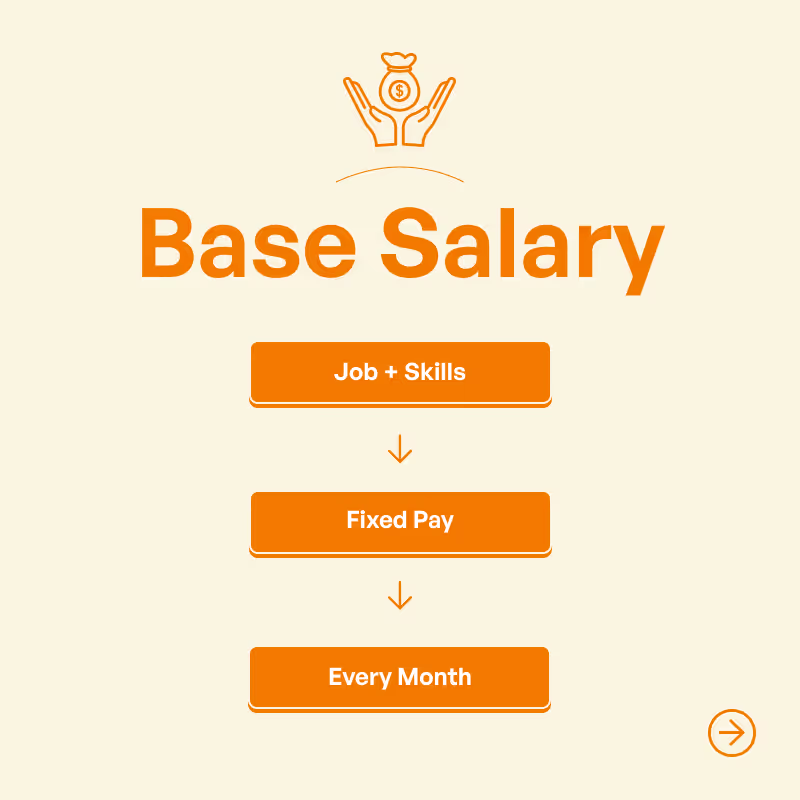
Base salary is typically determined by role responsibilities, experience, skills, market rates, and internal equity considerations.
Suppose a software engineer at a mid-sized tech company earns a base salary of $95,000 annually, paid bi-weekly. This amount remains constant regardless of project outcomes or company performance.
Pros:
- Predictable income: Employees can reliably budget personal finances around guaranteed monthly pay
- Attraction tool: Competitive base salaries signal role value and help secure quality candidates
- Simple administration: Fixed costs are easy to budget and require minimal ongoing management
- Legal compliance: Straightforward to ensure minimum wage and overtime requirements are met
Cons:
- Limited performance incentive: Fixed pay doesn't directly motivate higher productivity or exceptional results
- Salary compression: Over time, pay ranges can become compressed, causing equity issues between new hires and tenured employees
- Inflation erosion: Without regular adjustments, real purchasing power decreases over time
- Budget rigidity: Fixed costs are harder to adjust during economic downturns compared to variable pay
Bonuses
Bonuses are variable compensation payments tied to performance, results, or specific criteria. They align employee efforts with organizational goals by rewarding achievement of targets, exceptional performance, or key milestones. Common types include annual performance bonuses, sign-on bonuses, retention bonuses, and spot recognition awards.
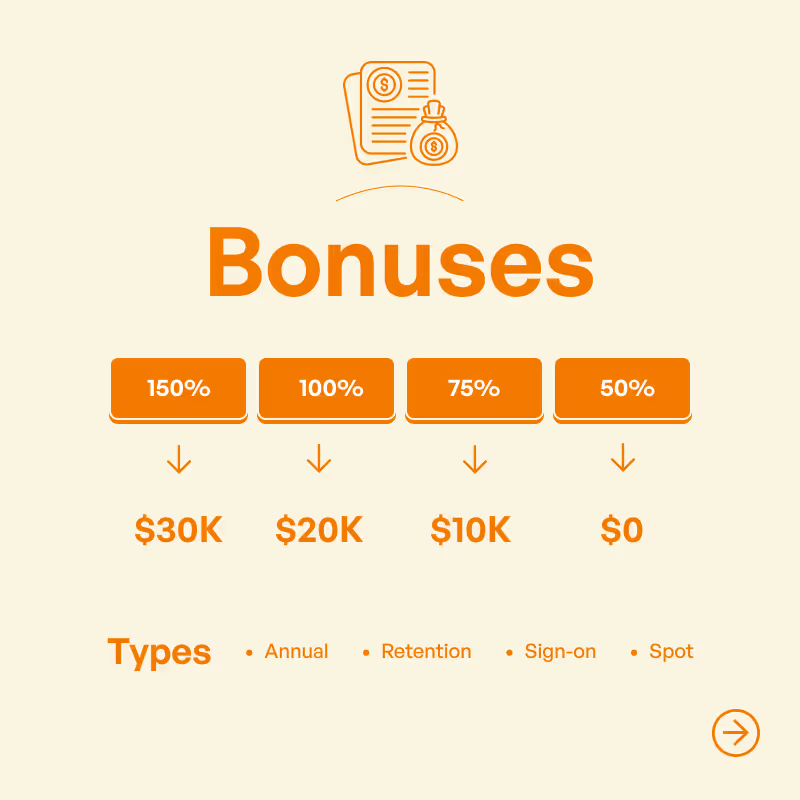
For example, a sales manager receives a $25,000 annual bonus for exceeding team revenue targets by 15%, plus a $5,000 spot bonus for successfully onboarding three new team members.
Pros:
- Performance motivation: Directly links rewards to results, encouraging higher productivity and goal achievement
- Flexible costs: Allows companies to adjust payouts based on business performance and financial health
- Retention tool: Multi-year bonus structures can encourage employees to stay through vesting periods
- Recognition mechanism: Provides tangible acknowledgment of exceptional contributions beyond base pay
Cons:
- Potential inequity: Unclear criteria or subjective evaluations can create perceptions of unfairness
- Short-term focus: May encourage employees to prioritize bonus-eligible activities over long-term value creation
- Expectation creep: Employees may begin viewing bonuses as guaranteed income rather than earned rewards
- Budget volatility: Unpredictable costs can strain finances if not properly planned and capped
Benefits
Benefits are non-wage compensatory offerings that address employees' healthcare, retirement, and other personal needs. They represent indirect compensation that provides security and supports work-life balance. Core benefits typically include health insurance, retirement plans, paid time off, life and disability insurance, and various wellness programs.

Companies offer many unique benefits to employees to encourage them to stay longer. For example, Zillow offers a unique employee benefit for nursing mothers who need to travel for work—they'll pay to ship breast milk from anywhere back to the employee's baby at home. This removes a significant source of stress for working mothers who would otherwise have to choose between weaning earlier than desired or turning down business travel opportunities.
Pros:
- Employee security: Provides essential safety nets for health, retirement, and emergencies
- Tax advantages: Many benefits offer favorable tax treatment for both employers and employees
- Attraction/retention: Strong benefits packages significantly influence job decisions and loyalty
- Productivity gains: Healthy, secure employees typically demonstrate higher engagement and lower absenteeism
Cons:
- High costs: Benefits can add 25-40% to base salary costs, with healthcare premiums rising faster than inflation
- Administrative complexity: Managing multiple plans requires significant HR resources and regulatory compliance
- One-size-fits-all challenges: Diverse employee needs make it difficult to create universally valued packages
- Underutilization: Some benefits may go unused, reducing return on investment for the organization
Equity
Equity compensation grants employees ownership stakes in the company through stock options, restricted stock units (RSUs), employee stock purchase plans, or direct stock grants. This aligns employee interests with company performance, as the business succeeds, employees directly benefit from increased share value.
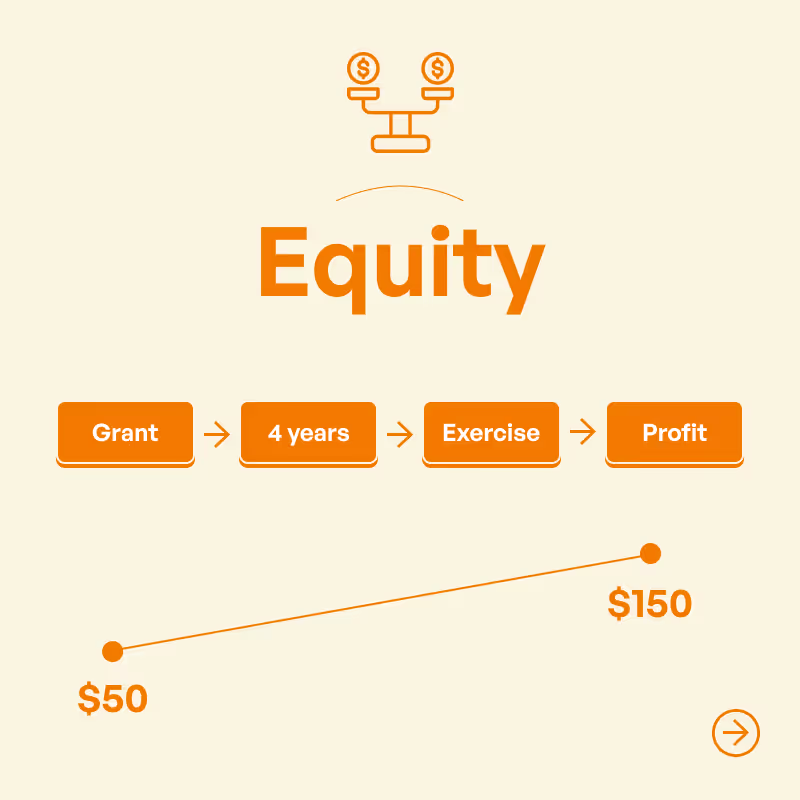
Suppose a product manager receives 1,000 RSUs vesting over four years, plus participation in an employee stock purchase plan allowing share purchases at a 15% discount. That’s an example of equity compensation.
Pros:
- Aligned interests: Creates an ownership mindset where employees benefit directly from company success
- High upside potential: Successful companies can generate significant wealth for employees through share appreciation
- Retention mechanism: Vesting schedules encourage employees to remain with the company long-term
- Cash conservation: Allows companies to compensate talent without immediate cash outlay, particularly valuable for startups
Cons:
- Risk and volatility: Stock value can fluctuate dramatically or become worthless, creating financial uncertainty
- Complexity: Tax implications, vesting schedules, and exercise decisions can confuse employees
- Delayed gratification: Value may not be realized for years, especially in private companies awaiting liquidity events
- Dilution concerns: Issuing equity reduces existing shareholders' ownership percentages and control
Perks
Perks are additional convenience-oriented offerings that enhance the work experience beyond core compensation and benefits. These "nice-to-have" additions reflect company culture and values, ranging from office amenities and flexible work arrangements to wellness programs and unique experiences.
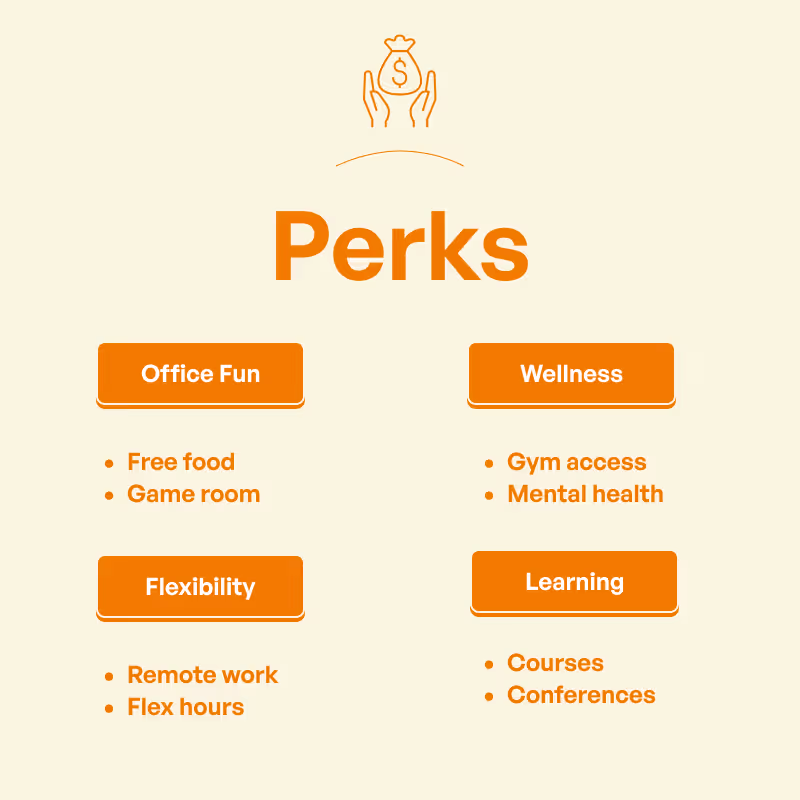
Companies like Netflix offer unlimited PTO as a perk, while Salesforce provides mindfulness zones and volunteer time off. Post-pandemic, many tech companies shifted from office-centric perks (ping-pong tables, free food) to remote-friendly options like home office stipends and virtual wellness programs.
Pros:
- Cultural differentiation: Unique perks help companies stand out in competitive talent markets and reinforce brand identity
- Employee satisfaction: Small conveniences can significantly boost daily morale and workplace enjoyment
- Productivity support: Well-designed perks (ergonomic equipment, mental health resources) can directly enhance performance
- Cost-effective benefits: Often provide high perceived value at relatively low cost compared to salary increases
Cons:
- Limited impact: Perks cannot compensate for inadequate base pay or poor management—they're supplements, not substitutes
- Misaligned usage: Some employees may exploit perks inappropriately or fail to appreciate their value
- Equity issues: Office-based perks may exclude remote workers, creating feelings of unfairness in hybrid environments
- Budget targets: Visible perks are often the first cut during downturns, potentially damaging morale and employer brand
What are the Legal and Compliance Considerations?
Compensation compliance has become increasingly complex, with violations carrying severe financial and reputational consequences. The U.S. Department of Labor recovered $1.4 billion for workers in enforcement actions during FY 2024 alone, highlighting the critical importance of adherence to compensation laws. Here are the six essential compliance areas every employer must address:
Wage and hour compliance
The Fair Labor Standards Act (FLSA) sets federal minimum wage and overtime requirements, but state and local laws often impose higher standards. As of 2024, 30 U.S. states and the District of Columbia have minimum wages exceeding the federal $7.25 per hour.
The overtime exemption threshold remains at $684 per week ($35,568 annually) after a federal court vacated the DOL's proposed increase in November 2024. Misclassifying employees as exempt when they should receive overtime can result in significant back-pay liabilities and DOL investigations.
Equal pay and anti-discrimination laws
Pay equity has gained unprecedented attention, with pay transparency laws now enacted in multiple states. California, New York, Colorado, and Washington require salary ranges in job postings, with Hawaii's law taking effect in 2024 and Illinois following in 2025.
The EU's Pay Transparency Directive, effective in 2026, will require companies to address gender pay gaps exceeding 5%. Regular pay audits are essential to identify and remediate unexplained disparities between employees performing similar work.
🔖Download our Pay Equity Audit Guide to understand the detailed pay equity process.
Employee vs. independent contractor classification
The DOL's March 2024 rule reinstated a six-factor economic realities test, making classifying workers as independent contractors harder. California's AB5 law remains the strictest, using the "ABC test," where failing any criterion results in employee classification. Misclassification can trigger liability for unpaid payroll taxes, overtime wages, and benefit contributions.
Section 409A deferred compensation rules
Non-qualified deferred compensation plans must comply with Section 409A of the Internal Revenue Code, which imposes strict rules on timing and distribution. Violations result in immediate taxation, a 20% penalty, and employee interest charges. Stock options granted below fair market value, inadequate severance plan structures, or improper deferral elections can trigger these punitive tax consequences.
Employee benefits plan compliance
ERISA governs most private-sector benefit plans, requiring proper documentation, annual Form 5500 filings, and fiduciary oversight. Late Form 5500 filings incur penalties up to $2,670 per day.
The Affordable Care Act adds employer mandate requirements for companies with 50+ full-time equivalent employees, while COBRA continuation coverage applies to employers with 20+ employees.
The SECURE Act 2.0 introduces new requirements, including automatic enrollment for 401(k) plans starting in 2025.
What’s Next?
Understanding the five core components of compensation in HRM—base salary, bonuses, benefits, equity, and perks—is essential for building effective total rewards strategies. Each serves a unique purpose: base salary provides stability, bonuses drive performance, benefits ensure security, equity aligns interests, and perks enhance culture.
Managing complex compensation across all five components requires an efficient platform. This is where we recommend: Compport.
Trusted by 300 companies and managing 1 M+ users, Compport is one of the few "no-limits" compensation platforms. From automated merit cycles and bonus simulations to pay equity audits and long-term incentive tracking, Compport handles everything in one unified system.
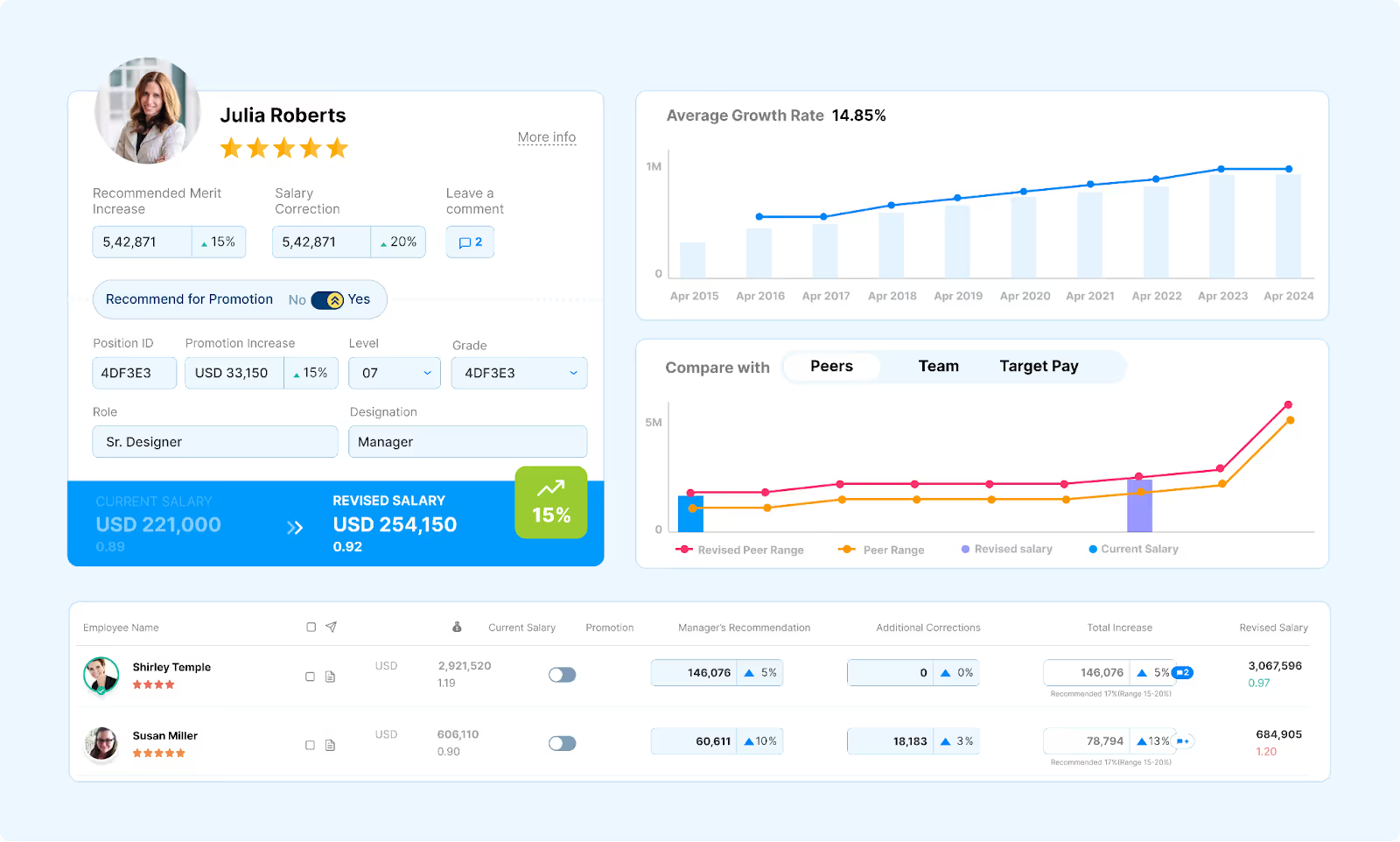
The platform's incredible configurability means it adapts to your unique processes, not vice versa.
Companies like Security Bank achieved 90% user satisfaction with Compport. With features like manager autonomy with guardrails, real-time benchmarking, and built-in compliance checks, Compport ensures your compensation strategy drives performance while meeting all legal requirements.
Ready to redefine your compensation strategy?

Schedule a demo with Compport!
FAQs
Which is an example of an ownership plan used in compensation systems?
Stock options, RSUs (Restricted Stock Units), and employee stock purchase plans (ESPPs) are common ownership plans. These equity compensation tools grant employees ownership stakes in the company, aligning their interests with business performance and success.
Which are the two main components of employee compensation?
The two main components are direct compensation (base salary and bonuses) and indirect compensation (benefits and perks). Direct compensation includes cash payments, while indirect compensation covers non-monetary offerings like health insurance and retirement plans.
What are the components of salary?
Salary typically refers to base salary—the fixed amount paid regularly for job duties. However, total compensation includes five components: base salary, bonuses, benefits, equity, and perks, which together form a comprehensive compensation package.
What is compensation in HRM?
Compensation in HRM is the total value employees receive for their work, including monetary payments (salary, bonuses) and non-monetary benefits (health insurance, retirement plans). It's designed to attract, motivate, and retain talent while supporting business objectives.
Which is not a component of compensation?
Work environment, company culture, management style, and job security are not direct compensation components. While these factors influence employee satisfaction, the five core compensation components are base salary, bonuses, benefits, equity, and perks.


%20(34).avif)
%20(50).png)
%20(49).png)
